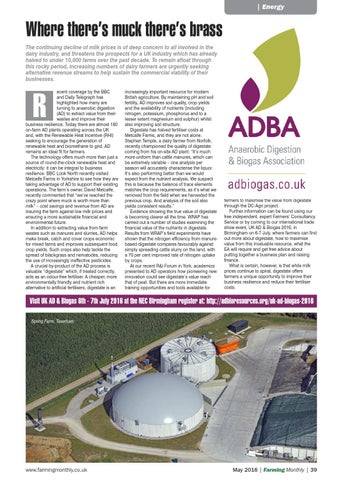| Energy
Where there’s muck there’s brass The continuing decline of milk prices is of deep concern to all involved in the dairy industry, and threatens the prospects for a UK industry which has already halved to under 10,000 farms over the past decade. To remain afloat through this rocky period, increasing numbers of dairy farmers are urgently seeking alternative revenue streams to help sustain the commercial viability of their businesses. ecent coverage by the BBC and Daily Telegraph has highlighted how many are turning to anaerobic digestion (AD) to extract value from their wastes and improve their business resilience. Today there are almost 180 on-farm AD plants operating across the UK and, with the Renewable Heat Incentive (RHI) seeking to encourage the generation of renewable heat and biomethane to grid, AD remains an ideal fit for farmers. The technology offers much more than just a source of round-the-clock renewable heat and electricity: it can be integral to business resilience. BBC Look North recently visited Metcalfe Farms in Yorkshire to see how they are taking advantage of AD to support their existing operations. The farm’s owner, David Metcalfe, recently commented that “we’ve reached the crazy point where muck is worth more than milk” – cost savings and revenue from AD are insuring the farm against low milk prices and ensuring a more sustainable financial and environmental future. In addition to extracting value from farm wastes such as manures and slurries, AD helps make break, catch and cover crops economic for mixed farms and improves subsequent food crop yields. Such crops also help tackle the spread of blackgrass and nematodes, reducing the use of increasingly ineffective pesticides. A crucial by-product of the AD process is valuable “digestate” which, if treated correctly, acts as an odour-free fertiliser. A cheaper, more environmentally friendly and nutrient rich alternative to artificial fertilisers, digestate is an
R
increasingly important resource for modern British agriculture. By maintaining pH and soil fertility, AD improves soil quality, crop yields and the availability of nutrients (including nitrogen, potassium, phosphorus and to a lesser extent magnesium and sulphur) whilst also improving soil structure. Digestate has halved fertiliser costs at Metcalfe Farms, and they are not alone. Stephen Temple, a dairy farmer from Norfolk, recently championed the quality of digestate coming from his on-site AD plant: “It’s much more uniform than cattle manures, which can be extremely variable – one analysis per season will accurately characterise the liquor. It’s also performing better than we would expect from the nutrient analysis. We suspect this is because the balance of trace elements matches the crop requirements, as it’s what we removed from the field when we harvested the previous crop. And analysis of the soil also yields consistent results.” Evidence showing the true value of digestate is becoming clearer all the time. WRAP has carried out a number of studies examining the financial value of the nutrients in digestate. Results from WRAP’s field experiments have shown that the nitrogen efficiency from manurebased digestate compares favourably against simply spreading cattle slurry on the land, with a 70 per cent improved rate of nitrogen uptake by crops. At our recent R&I Forum in York, academics presented to AD operators how pioneering new innovation could see digestate’s value reach that of peat. But there are more immediate training opportunities and tools available for
farmers to maximise the value from digestate through the DC-Agri project. Further information can be found using our free independent, expert Farmers’ Consultancy Service or by coming to our international trade show event, UK AD & Biogas 2016, in Birmingham on 6-7 July, where farmers can find out more about digestate, how to maximise value from this invaluable resource, what the EA will require and get free advice about putting together a business plan and raising finance. What is certain, however, is that while milk prices continue to spiral, digestate offers farmers a unique opportunity to improve their business resilience and reduce their fertiliser costs.
Visit UK AD & Biogas 6th - 7th July 2016 at the NEC Birmingham register at: http://adbioresources.org/uk-ad-biogas-2016 Spring Farm, Taverham
www.farmingmonthly.co.uk
May 2016 | Farming Monthly | 39
